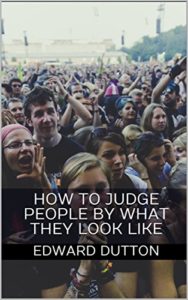The following is from an interview of HBD Chick that appeared on the Hoover Hog. I should say that I am an admirer of HBD Chick and follow her on Twitter.
Hoover Hog: I think it’s fair to say that one of the most polarizing figures in the HBD-o-sphere is Kevin MacDonald, whose work is mostly concerned with the evolutionary psychology of Judaism. I remember reading his book, A People That Shall Dwell Alone (long before that Cochran/Harpending/Hardy paper), and thinking that he made a fairly plausible case that Jewish identity could be understood as an evolutionary outcome. But when I got around to reading The Culture of Critique – a genuinely captivating book, whatever its merits – I came away with the impression that it was ultimately more of a polemic than a scientific treatise. Do you see value in MacDonald’s work, or is he off the reservation? More generally – and I could just as easily cite the work of Richard Lynn or Frank Salter in this context – how do you approach scholarly work that seems to be politically motivated?
HBD-Chick: Before I answer any of those questions, I’m just going to come right out and say that I admire Kevin MacDonald (and Richard Lynn and Frank Salter) very much. Anyone who stands their ground in the face of sometimes truly vitriolic political correctness deserves respect as far as I am concerned. I mean, as far as I can tell (and I haven’t read all of his books), MacDonald has compiled plenty of historical evidence in support of his theories. His theories may be wrong, or you may disagree with his theories or his approach, but he’s not making stuff up off the top of his head. (If he were, that’d be a different story.) If people object to what he has to say, they simply need to refute his evidence and/or argumentation. It’s really that simple. There’s no need for protests in his classroom or personal attacks in newspapers, etc., etc.
I don’t think MacDonald’s work is off the reservation at all – or if it is, so, too, is the work of people like Stephen Jay Gould and Jared Diamond (and many others!). I’ve only read A People that Shall Dwell Alone and three chapters from The Culture of Critique that happen to be floating around online – the one on Boasian anthropology, the one on the Frankfurt School, and the one on Jewish involvement in shaping U.S. immigration policy. I haven’t read Separation and Its Discontents at all. I don’t recall thinking that The Culture of Critique was very polemical, but perhaps that comes out more in the conclusion/other chapters (?).
KM: I am surprised that anyone would think CofC was polemical (I discuss why CofC had not gotten much traction for people like Hoover Hog here). A polemic on that topic could never have been published by an academic press.
I wouldn’t hesitate in reading MacDonald’s books even if he does have an ulterior political motive for writing them for the same reason that I still read Jared Diamond’s and other leftist academics’ books: because there’s often a lot to be learned from them! And now I’m talking about simply acquiring knowledge – getting my hands on new info or data – although I suppose one could also learn something about what motivates people to write academic books in the manner that they do. (~_^) Maybe MacDonald does primarily want to convey his social/political message in his books. So what? And Gould didn’t? It’s not the way I’d like it to work, but as one of my high school teachers once said – she was a nun, by the way – books are for inspiring thought, not dictating it.
KM: For the record, I started out on the left during the 1960s madness and only came to my present views after a lot of reading. Because I was intellectually on the left, the whole thrust of my work beginning in the 1980s was on thinking about culture from an evolutionary perspective and how culture could trump evolution. My first interest was in understanding European family patterns, particularly what Richard Alexander called socially imposed monogamy, where the emphasis was on how the mating patterns of wealthy, powerful males were regulated by social pressures emanating from powerful institutions and lower status males. (This work eventually emphasized both culture and our unique biological heritage.) Evolutionary psychology tends to theorize in a vacuum in which sexual behavior is determined by evolved modules, with no consideration of how social/cultural processes involving conflicts of interest over mating can affect the actual mating behavior of even very powerful individuals (like European monarchs). Because of this interest in the social regulation of mating, it was a short step to the idea that groups could regulate themselves — whence the idea of cultural group selection which forms the basis of A People That Shall Dwell Alone. Much of PTSDA describes how traditional Jewish groups regulated behavior within Jewish groups and between Jews and non-Jews. I chose Judaism as the case study because it is so well documented and only much later became a critic of Jewish behavior because, quite frankly, I came to realize that there are and have always been conflicts of interest between Jews and non-Jews. These conflicts assume center stage in Separation and Its Discontents and, of course, The Culture of Critique. No evolutionist should be surprised that ethnic groups often have conflicting interests — or that conflicts of interest can range from territorial struggles to the ivied halls of elite academic institutions. The tragedy of evolutionary science is that, apart from Frank Salter and me, the vast majority of evolutionists completely ignore selection against their own people that is occurring throughout the West. Read more
 How to Judge People by What They Look Like
How to Judge People by What They Look Like





